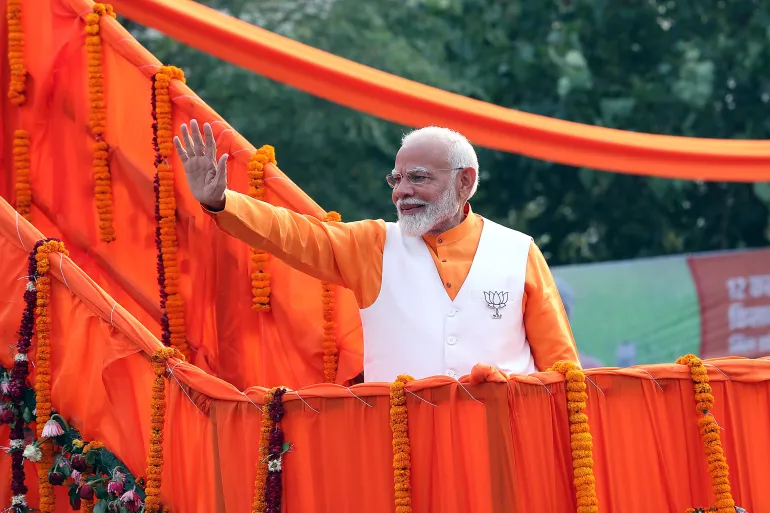Modi’s historic victory in the 2024 parliamentary elections, made him only the second leader to win three consecutive terms. His Hindu nationalist Bharatiya Janata Party (BJP) won 240 seats in the 543-seat Lok Sabha, falling 32 seats short of the 272 needed for a majority. As a result, the BJP will depend on coalition partners within the right-wing National Democratic Alliance (NDA) to form a government.
Modi’s campaign projected confidence, asserting that the NDA would surpass 400 seats. However, analysts were surprised by the strong performance of the Indian National Congress-led INDIA coalition, which won 231 seats, a significant increase from the 94 seats they secured in the 2019 elections. Analysts attribute this success largely to the support of Muslim voters.
Muslims, constituting about 14.2 percent of India’s population, played a pivotal role in key states and constituencies. This election marked a significant moment in Indian democracy as Muslim voters, previously perceived as divided, united behind opposition candidates across states like Uttar Pradesh, West Bengal, and the northeastern regions.
Zeyad Masroor Khan, a writer from Aligarh, Uttar Pradesh, emphasized that the election results showcased the political influence of Muslim voters. He noted that Muslims voted in large numbers despite facing challenges such as a heatwave and police baton charges in constituencies like Sambhal.
During the third phase of polling on May 7, in Sambhal, police baton-charged voters in four Muslim-dominated villages, causing injuries and chaos. Locals claimed the police action was unprovoked and aimed at discouraging votes for the opposition Samajwadi Party, part of the INDIA alliance.
Despite these obstacles, Sambhal saw a high voter turnout of 62.82 percent. Some residents believed that the turnout could have been even higher without the police intervention. “The Muslims have proved their significant political relevance,” Khan stated, adding that the results send a clear message to the BJP not to underestimate the political power of India’s largest minority.
In Uttar Pradesh, where Muslims constitute around 20 percent of the population, their support was crucial in defeating the BJP. In constituencies like Rampur and Azamgarh, the opposition’s victory margins were notably high. Ateeq Ahmed, a social worker from Faizabad, Uttar Pradesh, observed that while the BJP consolidated Hindu votes through its Hindutva agenda, Muslim voters united to impact the election outcome.
A similar trend was observed in West Bengal, known for its secular and pluralistic values. Despite the BJP’s aggressive campaign to polarize communities along religious lines, about 70 percent of the state’s 27 percent Muslim electorate supported the opposition Trinamool Congress (TMC). TMC leader Mamata Banerjee’s strong stance against the controversial Citizenship Amendment Act (CAA) and her outreach efforts solidified Muslim support for her party.
Mayukh Biswas, the All India General Secretary of the Students’ Federation of India (SFI), highlighted that the TMC’s landslide victory, securing over 29 out of 42 seats, was partly due to overwhelming Muslim backing, especially in Muslim-dominated districts like Murshidabad and Malda.
One of the most symbolic defeats for the BJP occurred in the Faizabad constituency of Uttar Pradesh, including Ayodhya, known for the Ram Janmabhoomi-Babri Masjid dispute. Despite the construction of the Ram temple and Modi’s grand inauguration, the BJP’s Hindutva agenda did not sway voters. Two-time BJP MP Lallu Singh was defeated by the opposition Samajwadi Party’s Awadhesh Prasad. Local journalist Sher Bahadur Sher noted that Modi’s rhetoric fell flat as voters prioritized unemployment and poverty over religious and caste-based politics.
Social worker Ahmed also pointed out that divisive hate speeches by BJP leaders during election rallies galvanized Muslim voters against the party. Similar electoral dynamics were observed in Manipur and Assam, following the familiar pattern of Muslim voters significantly impacting the election results.
In Bihar and Kerala, despite the smaller size of the Muslim electorate, their strategic support for Lalu Prasad Yadav’s Rashtriya Janata Dal (RJD)-Congress coalition and the incumbent Left alliance, respectively, made a significant impact. These voters demonstrated unity and prioritized practical governance and policy issues over religious identity. “For Muslims, the 2024 elections took on an existential dimension as fears grew of further alienation under another strong BJP government pushing a Hindu nationalist agenda,” explains Syed Ali Haider, a Muslim voter from Uttar Pradesh. “It was a game of survival for us.”
Dr. Salman Imtiaz, a Congress leader from Aligarh, Uttar Pradesh, offers further insights into the Muslim voter strategy. “Before 2014, Muslims never faced an existential worry, but after Modi came to power, the political system and media put us in an existential crisis.” This time, Muslim voters united and voted strategically. “The coordinated move by Muslim voters to abandon the incumbent in favor of its strongest opponents is a significant factor that has opened up the possibility of an opposition alliance forming a government at the center,” says Imtiaz. This sense of existential worry and survival united Muslim voters across India, encouraging them to support opposition groups.
Imtiaz cites the example of Uttar Pradesh, where Kumari Mayawati’s Bahujan Samaj Party (BSP) fielded some Muslim candidates. “Muslim voters knew that voting for Muslim leaders in the BSP would be futile, so they strategically supported the SP-Congress led alliance.” New Delhi-based writer Zeyad Masroor Khan agrees that the unification of Muslim voters helped build a strong opposition against the BJP. “BJP’s policies have been strictly anti-minority, affecting Muslims, Sikhs, and Dalits.”
“Minorities came out in large numbers to punish the Modi government,” Khan adds. Economic policies that impacted the poor, especially poor Muslims, also motivated large voter turnout. “I hope the election result leads to a reduction in the ongoing Islamophobic rhetoric in political discourse,” Khan says. “It signals that Muslims are still a very relevant political force in India.”










